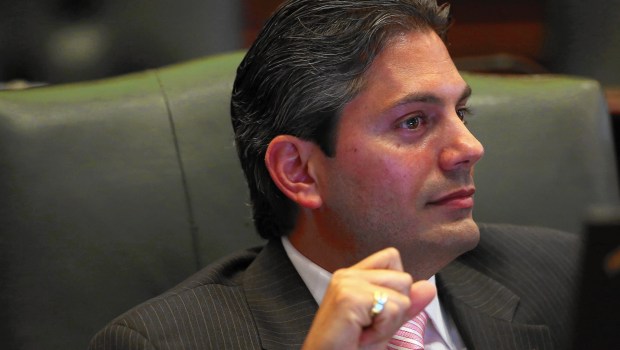Both candidates running for the 80th District Illinois House seat say there is need for reform in the criminal justice system, and that voters in this district, which encompasses several south and southwest suburbs, are looking for a representative who prioritizes their needs over party alignment.
Incumbent Democrat Anthony DeLuca, 54, of Chicago Heights has held the seat since 2009, and faces Republican Adam Beaty, a Braidwood police officer. Both ran unopposed in the March primaries.
Beaty wants to revamp the criminal justice reform law known as the SAFE-T Act. As a law enforcement officer, he said seen the law strain smaller department budgets by mandating training requirements.
“I want to go toe to toe with the SAFE-T Act,” he said. “It’s no secret that Illinois needs some critical overhaul of the criminal justice system and how things are done. However, the SAFE-T Act has been quite burdensome on many levels.”
Beaty also believes it undermines judges’ authority to order detainment for individuals who are flight risks or pose a danger to the community.
“I don’t have a problem with the whole bond situation, but we have to give judges a little bit more discretion when it comes to certain detainable offenses,” Beaty said.
Beaty said under the pretrial release changes, a person can be given a second chance to appear if they miss a court date, which he said could overwhelm the court system and fails to hold people accountable.
He seeks to alter the law to mandate that people who miss a court date face jail time until their next scheduled appearance before a judge.


He said residents in the district are concerned about public safety and a tough on crime approach is necessary.
In Braidwood, Beaty said the city has seen a rise in motor vehicle theft in recent years, which he attributes to the city’s proximity to Interstates 55 and 80. This allows offenders to quickly take vehicles and flee to Chicago, where they are harder to apprehend, he said.
For Beaty, the SAFE-T Act has done little to quell the fears of crime in the community.
“We don’t start putting people in jail until they’re repeatedly making offenses against the grave of the same thing, it’s just a revolving door,” he said. “We just catch and release, catch and release.”
DeLuca, mayor of Chicago Heights from 2003 to 2009, said one of his long-term goals has been to push through a bill that would address repeat juvenile gun offenders.
House Bill 990 requires judges to mandate three months of social service programs for juveniles who have previously been on probation for a non-injury gun offense. If the juvenile commits another gun offense, they would be committed to the Department of Juvenile Justice where they would receive services such as education, mental health support, drug treatment and mentoring.
“The complaint comes in from law enforcement, is they can get repeated probation over and over, and then what happens is these turn into hard core criminals as they get older,” DeLuca said. “So then by the time they’re adults, now they’re in a situation where they can’t be reformed.”
DeLuca said he has worked to get the bill passed for seven years, and said it would not only hold juvenile gun offenders accountable, but would also help reform offenders before they become adults.
“The original version of it was they would have to go to the detention center for six months, and that was not well received in Springfield,” he said. “So now it would provide services for them to try and reform them, and actually try and save some of these kids.”
Voters in the district are seeking relief from historically high property taxes, and are also worried about public safety and access to health care, DeLuca said.
In Chicago Heights, Saint James Hospital was closed and the property transformed into a housing complex for veterans. DeLuca said the city also lost its only Level One Trauma Center in the process, and said adding one to Franciscan Health Olympia Fields Hospital would be a roughly $15 million bill.
Beaty said he aims to improve parental involvement in education by advocating for more accessible school board meetings. He said he would focus on ensuring working parents have greater opportunities to participate and provide input in the school district.
Both DeLuca and Beaty seek to prioritize the needs of the people over strict party lines.
DeLuca said he has long voted independently on issues that may go “against the grain,” but believes this approach better reflects the preferences of voters.
“I pride myself on the fact that I’m independent with my voting on a lot of issues, and believe I represent the constituents the way they they’ve asked me to,” he said.
Beaty said many people have lost faith in Illinois politics and said he hopes to restore some of that faith.
“The idea that things are possible in Illinois, and there are good people serving us, rather than just party lines and the almighty dollar,” he said.
The district includes parts of Braidwood, Wilmington, Symerton, Wilton Center, Wilton, Manhattan, New Lenox, Richton Park, Park Forest, Crete, Steger and Chicago Heights.
State campaign finance disclosure reports show DeLuca’s campaign took in $106,875 in contributions in the July-September quarter. Expenditures were about $81,000, and at the end of the period, the campaign had more than $981,000 available to spend. His campaign’s largest contribution for this period was $10,000 from the Illinois Political Action Committee for Education filed Sept. 28.
For Beaty, receipts in the July-September period totaled $1,585. Expenses for the quarter were just over $2,000. At the end of the period, the campaign had about $73 left to spend.
Originally Published:







